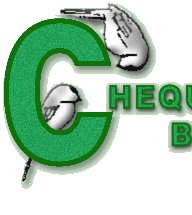Frequently Asked Questions
This section will be devoted to answering questions that are frequently asked about the Chequamegon Bird Club or birds and wildlife in general.
If you don't find the answer to your question, you are welcome to send us an E-mail
. You might also want to take a look at the LINKS page to see if your question might be found through another source.
Bird Related:
- Behavior
- Why does this bird (robins and cardinals are frequent offenders) repeatedly fly up against my window?
This kind of behavior is almost always territorial behavior. The offending bird sees the reflection of another "rival" bird in its territory and is flying at the image in an effort to chase it away. Once nesting activities have ceased, so will this behavior. In the meantime, whatever you can do to eliminate the reflection is the best way to prevent the attacks on your window.
- Why do we always see crows in groups of 3?
You are probably seeing parents with one offspring, perhaps the only survivor of 4-6 hatchlings. That one offspring stays around "helping" its parents until it's more prepared to mate and raise its own young.
- Bird-feeding
- When should I stop feeding hummingbirds in the Fall?
Many concerns have been raised that the feeding of hummingbirds in the Fall will prevent or postpone the initiation of migration until it's too late. Not to worry. The little hummers know when it's time to leave so enjoy them while you can.
- Is it safe to feed peanut butter to my backyard birds?
Yes, this high-fat food can be fed to birds. While many people are afraid it will stick to the roof of a bird's mouth, this thought seems to be ill-founded (Bird Watcher's Digest September/October '98). Spread peanut butter over tree bark or place small amounts in pinecones for edible ornaments with that homemade touch. You can also mix it in suet for a treat that chickadees and nuthatches won't leave alone.
- What good is grit?
Seed-eating birds need grit for digestion. Their gizzard grinds up the food, but this gritty material is needed to get the job done. You can provide grit in several ways. When there is no snow cover, a simple scrape in dry soil becomes a source of grit. During the winter you can mix a small amount of grit in with your bird seed. If you place grit on its own tray, be sure to keep it away from your feeders so it won't become contaminated.
- Is it harmful to add a little household bleach to kill the algae in my bird bath?
Chlorine kills living creatures, and can be harmful to birds. If you need to use chlorine bleach in your bird bath, use a very diluted but effective solution of about 1 tablespoon of bleach in 3 gallons of tepid water.
- Bird Identification
- There's no such thing as a Chicken Hawk!
- Nesting
- What can I do to encourage birds to nest in my yard?
Habitat, habitat, habitat! The more diverse the habitat, the better the chance of attracting nesting birds to your property. Food, water and shelter are the three main requirements of birds (nesting or not) so anything you can do to provide for these needs increases the chances that nesting will occur nearby. The placement of various kinds of man-made nest boxes can attract many tree hollow nesting species. Even setting out bits of string for birds to use in their nest building, while not really necessary from the bird's standpoint, can assist birds that are building nests in the area.
- How does a baby hummingbird, with such a long beak, keep from breaking its shell before hatching time?
While it is in the egg, a hummingbird has a very short, stubby beak. Its beak grows to normal size after it hatches.
- Laws & Regulations
- Can I make a collection of bird feathers or bird eggs?
Sorry, It's against the law to collect bird eggs, feathers or other bird parts.
- Miscellaneous
C.B.C. Club Related:









